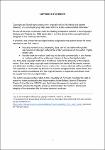Knowledge Construction and Multiple Realities: Global Health Collaborations, Development Practices, And Face Masks in The Context of Covid-19
| dc.contributor.supervisor | Punt, Michael | |
| dc.contributor.author | Zhang, Linan | |
| dc.contributor.other | Faculty of Arts and Humanities | en_US |
| dc.date.accessioned | 2024-04-22T15:13:32Z | |
| dc.date.available | 2024-04-22T15:13:32Z | |
| dc.date.issued | 2024 | |
| dc.identifier | 10650529 | en_US |
| dc.identifier.uri | https://pearl.plymouth.ac.uk/handle/10026.1/22296 | |
| dc.description.abstract |
This thesis is inspired by a global health collaborative programme named GRASPIT and by my own desire to do something good which can benefit the people in need as well as reduce suffering. The GRASPIT collaboration intended to improve post-operative outcomes, but the programme failed to deliver the expected result. Preliminary analysis by the GRASPIT team identified issues with knowledge sharing as one of the contributory causes of its failure. This prompted the reflection in this thesis upon apparent asymmetries when knowledge is shared. Quite soon after the research began, the global pandemic COVID-19 revealed the issue of having inconsistent knowledge regarding the public use of face masks, which shed new light on the problem of sharing health-related knowledge. The thesis took the position that both of these cases can be usefully situated in ‘development discourse’ and the power struggles that come with it. This suggested that these two vaguely connected concerns were both dealing with paradigm conflict during the process of knowledge sharing (and production), and that there existed multiple versions of health reality. As a way forward the thesis builds a theoretical framework that aims to improve the efficiency of knowledge sharing especially when there is no sufficient clinical solution available, drawing on Foucauldian philosophy, Latour and Woolgar’s Laboratory Life (1979), radical constructivism, and Rorty’s liberal ironism to alleviate roadblocks in knowledge sharing. By applying the theoretical framework to real-world problems, the thesis proposes a mindset for everyone to adopt as a means to improve ways in which knowledge generated in different contexts can be shared more effectively. | en_US |
| dc.language.iso | en | |
| dc.publisher | University of Plymouth | |
| dc.rights | Attribution-NonCommercial-NoDerivs 3.0 United States | * |
| dc.rights.uri | http://creativecommons.org/licenses/by-nc-nd/3.0/us/ | * |
| dc.subject | Global Health | en_US |
| dc.subject | Development Studies | en_US |
| dc.subject | Knowledge Sharing | en_US |
| dc.subject | Multiple Realities | en_US |
| dc.subject | Michel Foucault | en_US |
| dc.subject | Bruno Latour | en_US |
| dc.subject | Richard Rorty | en_US |
| dc.subject | Liberal Ironist | en_US |
| dc.subject | Constructivism | en_US |
| dc.subject | Face Mask | en_US |
| dc.subject | COVID-19 | en_US |
| dc.subject.classification | PhD | en_US |
| dc.title | Knowledge Construction and Multiple Realities: Global Health Collaborations, Development Practices, And Face Masks in The Context of Covid-19 | en_US |
| dc.type | Thesis | |
| plymouth.version | publishable | en_US |
| dc.identifier.doi | http://dx.doi.org/10.24382/5175 | |
| dc.rights.embargoperiod | No embargo | en_US |
| dc.type.qualification | Doctorate | en_US |
| rioxxterms.version | NA |
Files in this item
This item appears in the following Collection(s)
-
01 Research Theses Main Collection
Research Theses Main



